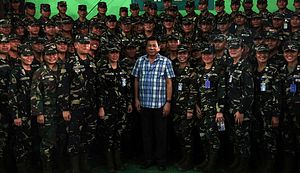In a rare joint special session held in the Philippine House of Representatives over the weekend, both the lower House and the Senate approved the appeal of President Rodrigo Duterte to extend martial law to quell rebellion and terrorism in Mindanao until the end of the year. This constitutional mandate allowed representatives and senators to vote jointly in a special session after a majority vote from Congress.
In his second State of the Nation Address (SONA) on July 24, Duterte reiterated his adamant justification of the five-month extension of martial law to prepare for both the future of war-torn Marawi City and the expected counter-retaliation from terrorist supporters.
Amid the security crisis, strongman Duterte enjoys overwhelming trust ratings from Filipinos. But pessimists think that the longevity of the Marawi siege attests to the government’s failure to address the volatility and complexity of Islamic State-inspired terrorism in southern Philippines. If security actors in the Philippines lack the foresight to build scenarios to address uncertainties in the national security environment, it will lead to reactive than proactive policies. In this context, it’s worth asking two questions: Why is there a need to extend martial law, and what is the future of Marawi?
Duterte’s martial law lays down a peculiar context, separate from the dark time of the country’s abusive experience of martial law under the tenure of former President Ferdinand Marcos. While following similar patterns, the current martial law in Mindanao empowers security forces (primarily the military and police) to exercise their constitutional mandate to safeguard citizens from the enemies of the state.
The dark years of martial law in 1970s left the Marcos authoritarian regime thriving under deliberately weak democratic institutions. The rule of law was subverted while checks and balances in the exercise of governmental power were lost. Absolute power was centralized in the hands of the autocrat, whose continued rule constituted an open invitation to challenge. The autocratic regime relied heavily on the use of state violence to suppress those challenges.
After more than four decades, the grim experience of the first martial law imposed nationwide has not vanished from the memories and narratives of Filipino victims. Those memories presently haunt the new victims of the new martial law being strictly enforced in the country’s second largest and Muslim-dominated island.
Proclamation No. 1081 under Marcos’ martial law suspended civil rights and imposed military authority, stressing the need for extra powers to quell the rising wave of violence allegedly caused by the communists. Today, Proclamation No. 216 under Duterte’s martial law suspended the privilege of the writ of habeas corpus in Mindanao in order to crush jihadi terrorists.
The opaque and oppressive regime of martial law under Marcos was characterized by the absence of transparency and accountability, breeding corruption that eventually seeped into the security institutions. Consequently, the new martial law tries to negate the conditions of the past to stabilize a high-risk security threat. To defeat terrorist groups, the national security forces should be bounded by legal instruments and accountability despite the fear and suspicion engendered through the extension of martial law in Mindanao.
Before, the military ceased to be a corporate body of professionals that served the interest of the society it is sworn to protect; its leadership was placed in the hands of officers loyal to the Marcos regime, resulting in the rise of personality cliques. Policies became personal instead of institutional, and in the end, democratic civilian oversight was lost. Today, we could instead see professionalized security officers striving to increase their proficiency, having been trained to increase their war fighting and leadership skills to meet contemporary security challenges.
The strategic endgame of the new martial law can be described as paving the way for the country’s internal stability by defeating terrorist groups and armed peace spoilers, resolving conflicts with major insurgent armed groups, and securing an environment to enable civil authorities to maintain public order or build the foundations for inclusive growth. All the authorities involved in the new iteration of martial law should remember its real cause and grandest intents in order to shy away from the abuses of the past regime and reconstruct the military’s image as a means to protect the state from its enemies.
Chester Cabalza, Ph.D. is an Associate Professor at the National Defense College of the Philippines and a Senior Lecturer at the University of the Philippines Diliman. The views of the author are his own and do not represent his organizational affiliations.

































